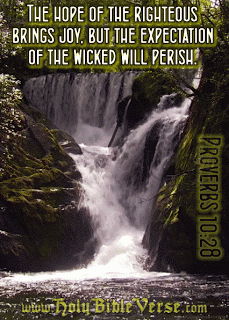

A Song of VictoryPsalm 1181 O give thanks to the Lord, for he is good;his steadfast love endures for ever!
2 Let Israel say,
5 Out of my distress I called on the Lord;
8 It is better to take refuge in the Lord
10 All nations surrounded me;
13 I was pushed hard, so that I was falling,
15 There are glad songs of victory in the tents of the righteous:
19 Open to me the gates of righteousness,
20 This is the gate of the Lord;
21 I thank you that you have answered me
24 This is the day that the Lord has made;
26 Blessed is the one who comes in the name of the Lord.
28 You are my God, and I will give thanks to you;
29 O give thanks to the Lord, for he is good,
|
Thomas Constable on Psalm 118Psalms 113 through 118 are the Hallal PsalmsThis is the last in this series of the Egyptian Hallel psalms (Psalms 113-118). It describes a festal procession to the temple to praise and sacrifice to the Lord. The historical background may be the dedication of the restored walls and gates of Jerusalem in Ezra and Nehemiah’s time, following the return from Babylonian captivity, in 444 B.C. It contains elements of communal thanksgiving, individual thanksgiving, and liturgical psalms. The subject is God’s loyal love for His people. The situation behind it seems to be God’s restoration of the psalmist after a period of dishonor. This would have been a very appropriate psalm to sing during the Feast of Tabernacles as well as at Passover and Pentecost. The Lord Jesus and His disciples probably sang it together in the Upper Room at the end of the Lord’s Supper (cf. Matthew 26:30). "As the final psalm of the 'Egyptian Hallel,' sung to celebrate the Passover...this psalm may have pictured to those who first sang it the rescue of Israel at the Exodus, and the eventual journey’s end at Mount Zion. But it was destined to be fulfilled more perfectly, as the echoes of it on Palm Sunday and in the Passion Week make clear to every reader of the Gospels." 1. Praise for Yahweh’s loyal love 118:1-4 The first verse is a call to acknowledge God’s lovingkindness. Then the psalmist appealed to all Israel, the priests, and all those who fear God to acknowledge the limitless quality of His loyal love (cf. Psalms 115:9-13). Perhaps this call and response structure found expression in antiphonal worship in which a leader or leaders issued the call and the people responded out loud. Verses 5-9The writer gave personal testimony to God’s deliverance of him in answer to prayer. Setting him in "a large place" (Psalms 118:5 (NAS ) 5 "From my distress I called upon the Lord; The Lord answered me and set me in a large place." Psalms 118:5, NASB) pictures freedom to move about without constraint. Since God was with him, he did not need to fear what other people might do to him. Hebrews 13:6 (NAS) 6 "...so that we confidently say, ' The Lord is my helper, I will not be afraid. What will man do to me?'" (Hebrews 13:6). Furthermore the Lord would be his helper, so he could expect to prevail over his adversaries. Therefore it is better to trust in Yahweh than to place one’s confidence in men, even the most powerful of men. "Man" and "princes" (Psalms 118:8-9 (NAS) 8 "It is better to take refuge in the Lord Than to trust in man. 9 It is better to take refuge in the Lord Than to trust in princes." (Psalms 118:8-9) --constitute a merism meaning all people, both lowly and exalted. 3 Do not trust in princes, "In mortal man, in whom there is no salvation." Psalms 146:3). Verses 10-13Note how the Lord gave the psalmist confidence even when his enemies surrounded him. The Lord had cut off his enemies in the past, and he believed He would do so again. The repetition of the phrase in 10 "All nations surrounded me; In the name of the Lord I will surely cut them off." Psalms 118:10 b, Psalms 118:10 (NAS) 10 "All nations surrounded me; In the name of the Lord I will surely cut them off." Psalms 118:10:11 b, and Psalms 118:12 (NAS) 12 "They surrounded me like bees; They were extinguished as a fire of thorns; In the name of the Lord I will surely cut them off." Psalms 118:12 c expresses his trust in the Lord. The Hebrew word for "cut them off"-- 10 "All nations surrounded me; In the name of the Lord I will surely cut them off." 11 "They surrounded me, yes, they surrounded me; In the name of the Lord I will surely cut them off. 12 They surrounded me like bees; They were extinguished as a fire of thorns; In the name of the Lord I will surely cut them off." (Psalms 118:10-12) literally means "circumcised them." This may be a prophetic reference to Messiah circumcising the hearts of the Gentiles. Circumcision was a physical procedure, but it came to symbolize a spiritual change, namely, trust in God (Deuteronomy 30:6; cf. Romans 2:29 (NAS) 29 "But he is a Jew who is one inwardly; and circumcision is that which is of the heart, by the Spirit, not by the letter; and his praise is not from men, but from God." (Romans 2:29). Verses 14-21The psalmist had relied on the Lord as his strength and his source of joy, and He had saved him. Psalms 118:14 (NAS) 14 "The Lord is my strength and song, And He has become my salvation." Psalms 118:14 repeats the first line of the Song of the Sea (Exodus 15:2 (NAS) 2 "The Lord is my strength and song, And He has become my salvation; This is my God, and I will praise Him; My father's God, and I will extol Him." (Exodus 15:2)--the song the Israelites sang just after they crossed the Red Sea successfully. The psalmist rejoiced in God’s saving strength. Temporary discipline had led to recent deliverance, and this provided hope for future salvation. The gates in view probably refer to the temple courtyard gates through which worshipers such as the writer entered to praise God. What a comfort! Psalms 118:15-18 (NAS) 15 "The sound of joyful shouting and salvation is in the tents of the righteous; The right hand of the Lord does valiantly. 16 The right hand of the Lord is exalted; The right hand of the Lord does valiantly. 17 I will not die, but live, And tell of the works of the Lord. 18 The Lord has disciplined me severely, But He has not given me over to death." Psalms 118:15-18 would have been the choice of the Lord Jesus as He sang them at His last Passover in the Upper Room! They assured Him that He would live again even though He would die. Verses 22-24The psalmist seems to have been comparing himself to the stone that the builders (his adversaries) had rejected, in view of the preceding context. 18 "The Lord has disciplined me severely, But He has not given me over to death." (Psalms 118:18). The imagery is common. Whenever builders construct a stone building they discard some stones because they do not fit. The writer had felt discarded like one of these stones, but God had restored him to usefulness and given him a position of prominence in God’s work. "Corner stone" (NASB) is more accurate than "capstone" (NIV). The cornerstone of a large building was the largest and or most important stone in the foundation. All the other foundation stones were laid and aligned in reference to this key stone. Only God could have done this (Psalms 118:23) 23 "This is the Lord's doing; It is marvelous in our eyes." (Psalms 118:23). The day of his restoration was obviously one God had brought to pass. Consequently the writer called on everyone to rejoice with him in it. There are many New Testament references to the stone of Psalms 118:22 (NAS) 22 "The stone which the builders rejected Has become the chief corner stone." Psalms 118:22. The Lord Jesus applied it to Himself (Matthew 21:42 (NAS) 42 "Jesus said to them, 'Did you never read in the Scriptures, ‘The stone which the builders rejected, This became the chief corner stone; This came about from the Lord, And it is marvelous in our eyes'? Matthew 21:42; Mark 12:10-11 (NAS) 10 "Have you not even read this Scripture: ‘The stone which the builders rejected, This became the chief corner stone; 11 This came about from the Lord, And it is marvelous in our eyes?" Mark 12:10-11; Luke 20:17 (NAS) 17 "But Jesus looked at them and said, 'What then is this that is written: ‘The stone which the builders rejected, This became the chief corner stone'?" Luke 20:17). Peter and Paul also applied it to Jesus (Acts 4:11) 11 "He is the stone which was rejected by you, the builders, but which became the chief corner stone." Ephesians 2:20 (NAS) 20 "...having been built on the foundation of the apostles and prophets, Christ Jesus Himself being the corner stone," Ephesians 2:20; 1 Peter 2:6-8 (NAS) 6 "For this is contained in Scripture: 'Behold , I lay in Zion a choice stone, a precious corner stone, And he who believes in Him will not be disappointed.' 7 This precious value, then, is for you who believe; but for those who disbelieve, ' The stone which the builders rejected , This became the very corner stone,' 8 and, 'A stone of stumbling and a rock of offense'; for they stumble because they are disobedient to the word, and to this doom they were also appointed." (1 Peter 2:6-8). God’s amazing resurrection of His rejected Son to the place of supreme universal authority is marvelous to say the least. The day of His resurrection is the greatest day the Lord ever made. It is indeed the basis for the Christian’s joy and rejoicing. Verses 25-29The psalmist proceeded to pray for the salvation and prosperity of his people (Psalms 118:25-26 (NAS) 25 "O Lord , do save, we beseech You; O Lord , we beseech You, do send prosperity!" 26 "Blessed is the one who comes in the name of the Lord; We have blessed you from the house of the Lord." (Psalms 118:25-26). The one who comes in the Lord’s name refers to anyone who came to worship Yahweh at the temple. The psalmist and the people blessed such a one from the temple. The writer further glorified Yahweh as the giver of light to His people. The NIV of (NAS) 27 "The Lord is God, and He has given us light; Bind the festival sacrifice with cords to the horns of the altar." Psalms 118:27b gives a better rendering of the Hebrew text than the NASB. It reads, "With boughs in hand, join in the festal procession up to the horns of the altar." This probably refers to a custom at the Feast of Tabernacles. The people waved branches to honor the Lord. Psalms 118:29. 29 "Give thanks to the Lord, for He is good; For His lovingkindness is everlasting." This psalm teaches us much about Messiah, but its primary significance, as the Israelites used it originally, was glorifying God for providing deliverance. This deliverance came after a period of evident defeat. God had reversed an apparent disaster and brought great joy and victory out of it. We should praise Him, as the writer called on His hearers to do, whenever He does that for us. Thomas Constable Commentary |

Wikipedia: This article is about Psalm 118 in Hebrew (Masoretic) numbering.Psalm 118 is the 118th psalm of the Book of Psalms, beginning in English in the King James Version: "O give thanks unto the LORD; for he is good: because his mercy endureth for ever." The Book of Psalms is part of the third section of the Hebrew Bible, and a book of the ChristianOld Testament. In the Greek Septuagint version of the Bible, and in its Latin translation in the Vulgate, this psalm is Psalm 117 in a slightly different numbering system. In Latin, it is known as "Confitemini Domino quoniam bonus quoniam in saeculum misericordia eius". Its themes are thanksgiving to God and reliance on God rather than on human strength. The psalm is a regular part of Jewish, Catholic, Orthodox, Lutheran, Anglican and other Protestant liturgies. Hebrew text of Psalm 118
King James Version
Judaism
|
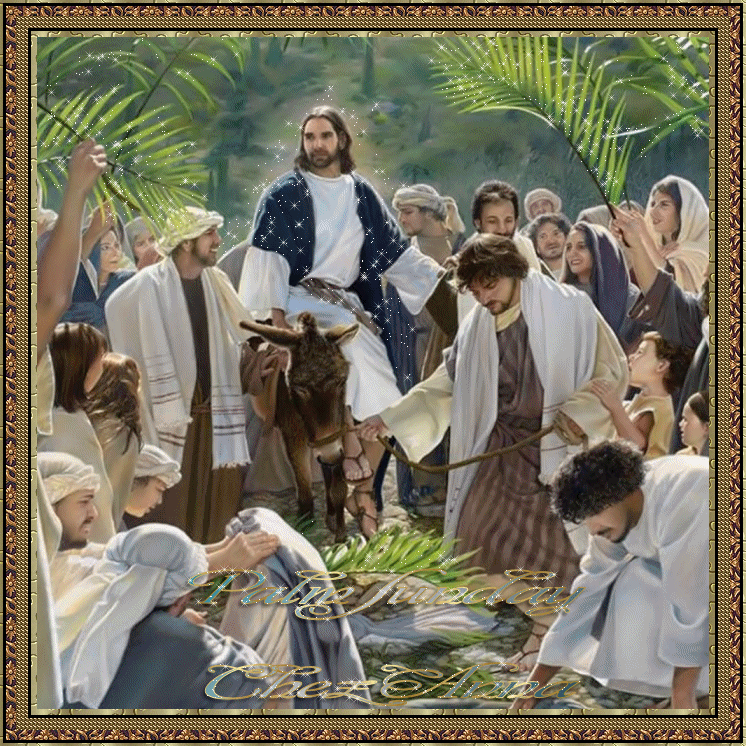
![]()
In its positive sense, the word is used of kindness or love between people, of piety of people towards God as well as of love or mercy of God towards humanity. It is frequently used in Psalms in the latter sense, where it is traditionally translated "lovingkindness" in English translations.
In Jewish theology it is likewise used of God's love for the Children of Israel, and in Jewish ethics it is used for love or charity between people. Chesed in this latter sense of "charity" is considered a virtue on its own, and also for its contribution to tikkun olam (repairing the world). It is also considered the foundation of many religious commandments practiced by traditional Jews, especially interpersonal commandments.
Chesed is also one of the ten Sephirot on the Kabbalistic Tree of Life. It is given the association of kindness and love, and is the first of the emotive attributes of the sephirot.
(Note from Lambert: There is a dark side to the Kabbalah to be avoided by us novices, similar to the cults and isms of Christianity.)
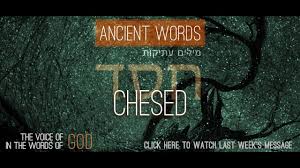
The root chasad has a primary meaning of "eager and ardent desire," used both in the sense "good, kind" and "shame, contempt". The noun chesed inherits both senses, on one hand "zeal, love, kindness towards someone" and on the other "zeal, ardour against someone; envy, reproach". In its positive it is used of mutual benevolence, mercy or pity between people, of piety of people towards God, as well as grace, favour or mercy of God towards people.
It occurs 248 times in the Hebrew Bible. In the majority of cases (149 times), the King James Bible translation is "mercy", following LXX eleos. Less frequent translations are: "kindness" (40 times), "lovingkindness" (30 times), "goodness" (12 times), "kindly" (5 times), "merciful" (4 times), "favour" (3 times) and "good", "goodliness", "pity" (once each). Only two instances of the noun in its negative sense are in the text, translated "reproach" in Psalm 57:3, and "wicked thing" in Leviticus 20:17.
The translation of loving kindness in KJV is derived from the Coverdale Bible of 1535. This particular translation is used exclusively of chesed used of the benign attitude of YHWH ("the LORD") or Elohim ("God") towards his chosen, primarily invoked in Psalms (23 times), but also in the prophets, four times in Jeremiah, twice in Isaiah 63:7 and once in Hosea 2:19. While "lovingkindness" is now considered somewhat archaic, it is part of the traditional rendition of Psalms in English Bible translations. Some more recent translations use "steadfast love" where KJV has "lovingkindness."
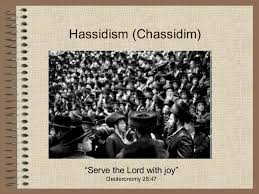
Lambert, it occurred to me recently that the plural of chesed is, as you know, chassedim, the word used of the pious.
More properly it should mean, "The company of those who love and are loved by God."
David & Carolyn Roper, 2503 Bruins Circle, Boise, ID 83704208-376-6607

Hallel (Hebrew: הַלֵּל, "Praise") is a Jewish prayer, a verbatim recitation Psalms 113–118 which is recited by observant Jews on Jewish holidays as an act of praise and thanksgiving.
Hallel consists of six Psalms (113–118), which are recited as a unit, on joyous occasions including the Three Pilgrimage Festivals mentioned in the Torah, Passover (Pesach), Shavuot, and Sukkot, as well as at Hanukkah and Rosh Chodesh (beginning of the new month).
Hallel is recited during the evening prayers on the first (and, outside Israel, second) night of Pesach, except by Lithuanian and German Jews, and by all communities during the Passover Seder service. According to the Talmud, there was a dispute between the school of Hillel and the school of Shammai regarding the reading of Hallel on Pesach. According to the school of Shammai, only the first psalm (Psalm 113) should be read before the meal, whereas the school of Hillel advocated reading the first two psalms (Psalm 113 and 114). The remaining Psalms would be said after the Grace After Meals (as is usually the case, the halacha follows the school of Hillel).
Although Hallel generally refers only to the aforementioned psalms, the Talmud also refers to Psalm 136 as "the Great Hallel". Each verse of Psalm 136 concludes with the refrain "for his mercy endures forever" and it contains mention of twenty-six acts of Divine kindness and sustenance for the world. It is recited at the Pesach Seder after the standard Hallel is completed. It is also said in the expanded Pesukei dezimra on the morning of Shabbat and festivals. In the Talmudic era, if rain fell on the morning of a fast day that was declared in response to a drought, this was seen as a sign of Divine favor, in which case "the Great Hallel" was added in the afternoon prayers. There is mention in some references that this Psalm may also be used antiphonally in Temple worship.
On Rosh Hashanah and Yom Kippur, Hallel is not said at all, because as the Talmud states (Arachin 10b): "Is it seemly for the king to be sitting on His Throne of Judgment, with the Books of Life and Death open before Him, and for the people to sing joyful praises to Him?"
Pesach, like Sukkot, has the structure of "main holiday", followed by "Intermediate Days" (Chol HaMoed), followed by "main holiday". Since Pesach involved only a partial redemption of the Jews and the destruction of Egypt, and as the same sacrifice was offered in the Temple on every day of the holiday (as opposed to Sukkot), only "Half" (or Partial) Hallel is recited on all of the last six days of Pesach. Full Hallel is recited for the entirety of Sukkot.
Partial Hallel is recited on Rosh Chodesh because it was introduced at a much later time than the major holidays.
No Hallel, neither "Full" nor "Partial", is recited on Purim, despite the fact that there was a miraculous salvation, for several reasons:
Full Hallel (Hebrew: הלל שלם, romanized: Hallel shalem, lit. 'complete Hallel') consists of all six Psalms of the Hallel, in their entirety. It is a Jewish prayer recited on the first two nights and days of Pesach (only the first night and day in Israel), on Shavuot, all seven days of Sukkot, on Shemini Atzeret and Simchat Torah, and on the eight days of Hanukkah. The sages have provided a "siman" (a way to remember) the days when full Hallel is recited. It is called "BeBeTaCh".
Full Hallel consists of Psalm 113, Psalm 114, Psalm 115:1–11,12–18, Psalm 116:1–11,12–19, Psalm 117, Psalm 118.
Psalm 136 was most probably used antiphonally in Temple worship. In Jewish liturgy, the Great Hallel is recited at the Pesach Seder after the Lesser Hallel. All through the refrain is a repeated reference to the Lord's steadfast love (see Hosea 2:19). This psalm is a hymn that opens with a call to praise God because of God's great deeds in nature and God's gracious historical actions in the history of Israel. It continues expressing God's mercy toward all and ends with another call to praise God.
A blessing is recited at the beginning and end of Full Hallel.
Partial Hallel (Hebrew: romanized: chatzi Hallel, lit. 'half Hallel') omits parts of the Full Hallel: The first eleven verses of Psalms 115 and 116 are omitted. It is recited on the last six days of Pesach and on Rosh Chodes..
While Ashkenazi Jews recite a blessing at the beginning and end of Partial Hallel, some Sephardi Jews do not, particularly if the blessing they recite at the beginning of Full Hallel is ligmor et hahallel (to complete the Hallel) instead of likro et hahallel (to read the Hallel) as recited by Ashkenazi Jews.
The New Testament accounts of the Last Supper state that Jesus and his disciples "sang a psalm" or "hymn" after the meal before leaving for the Mount of Olives (Matthew 26:30, Mark 14:26), which may have been the Hallel. The Last Supper is popularly considered to have been a celebration of the Passover, although this is controversial among scholars. Jesus, like any other literate Jew in the first century, may well have known how to chant the Psalms in Hebrew, especially the famous Hallel psalms which were an integral part of the Passover.
In the Jewish tradition, there are well established and various melodies for the singing of Hallel. Some of the psalms are sung while others are recited silently or under the breath.
In the classical tradition, psalms from the Hallel have been set to music many times, notably:
American composer and conductor Michael Isaacson has composed a full Hallel for SATB chorus, entitled An American Hallel, with interpolations of expressions of praise and gratitude by past and present Americans. It was premiered by the Carolina Master Chorale under the directorship of Tim Koch in the autumn of 2009.
Composer/performer Sam Glaser has also set the Psalms on his CD Hallel.
The name "Hallel" is normally applied to Psalms 113–118. For greater specificity this is sometimes called the Egyptian Hallel (Hallel Miẓri). This name is due to its mention of the Exodus from Egypt in Psalms 114:1.
The term Great Hallel (Hallel HaGadol) is used to refer to Psalm 136; according to other opinions in the Talmud, Great Hallel refers to either Psalms 135-136 or 134-136.
Pesukei dezimra is also described by the Talmud as a kind of Hallel.
Many Jewish communities, especially those which identify with religious Zionism, recite Hallel on Yom Ha'atzmaut (Israeli Independence Day) and some also recite it on Yom Yerushalayim (the day commemorating the reunification of Jerusalem in 1967). The Chief Rabbinate of Israel instructs Jews to recite Hallel during Yom Ha'atzmaut. On those occasions, Hallel is usually chanted aloud as part of Shacharit (the morning prayer service) following the Shacharit's Shemoneh Esreh ("The Eighteen," the main prayer). (Wikipedia)
The Other Hallel Psalms
Psalm 113God the Helper of the NeedyPraise, O servants of the Lord; praise the name of the Lord. 2 Blessed be the name of the Lord from this time on and for evermore. 3 From the rising of the sun to its setting the name of the Lord is to be praised. 4 The Lord is high above all nations, and his glory above the heavens. 5 Who is like the Lord our God, who is seated on high, 6 who looks far down on the heavens and the earth? 7 He raises the poor from the dust, and lifts the needy from the ash heap, 8 to make them sit with princes, with the princes of his people. 9 He gives the barren woman a home, making her the joyous mother of children. Praise the Lord! Psalm 114God’s Wonders at the Exodus1 When Israel went out from Egypt,the house of Jacob from a people of strange language, 2 Judah became God’s sanctuary, Israel his dominion. 3 The sea looked and fled; Jordan turned back. 4 The mountains skipped like rams, the hills like lambs. 5 Why is it, O sea, that you flee? O Jordan, that you turn back? 6 O mountains, that you skip like rams? O hills, like lambs? 7 Tremble, O earth, at the presence of the Lord, at the presence of the God of Jacob, 8 who turns the rock into a pool of water, the flint into a spring of water. Psalm 115The Impotence of Idols and the Greatness of God1 Not to us, O Lord, not to us, but to your name give glory,for the sake of your steadfast love and your faithfulness. 2 Why should the nations say, ‘Where is their God?’ 3 Our God is in the heavens; he does whatever he pleases. 4 Their idols are silver and gold, the work of human hands. 5 They have mouths, but do not speak; eyes, but do not see. 6 They have ears, but do not hear; noses, but do not smell. 7 They have hands, but do not feel; feet, but do not walk; they make no sound in their throats. 8 Those who make them are like them; so are all who trust in them. 9 O Israel, trust in the Lord! He is their help and their shield. 10 O house of Aaron, trust in the Lord! He is their help and their shield. 11 You who fear the Lord, trust in the Lord! He is their help and their shield. 12 The Lord has been mindful of us; he will bless us; he will bless the house of Israel; he will bless the house of Aaron; 13 he will bless those who fear the Lord, both small and great. 14 May the Lord give you increase, both you and your children. 15 May you be blessed by the Lord, who made heaven and earth. 16 The heavens are the Lord’s heavens, but the earth he has given to human beings. 17 The dead do not praise the Lord, nor do any that go down into silence. 18 But we will bless the Lord from this time on and for evermore. Praise the Lord! Psalm 116Thanksgiving for Recovery from Illness1 I love the Lord, because he has heardmy voice and my supplications. 2 Because he inclined his ear to me, therefore I will call on him as long as I live. 3 The snares of death encompassed me; the pangs of Sheol laid hold on me; I suffered distress and anguish. 4 Then I called on the name of the Lord: ‘O Lord, I pray, save my life!’ 5 Gracious is the Lord, and righteous; our God is merciful. 6 The Lord protects the simple; when I was brought low, he saved me. 7 Return, O my soul, to your rest, for the Lord has dealt bountifully with you. 8 For you have delivered my soul from death, my eyes from tears, my feet from stumbling. 9 I walk before the Lord in the land of the living. 10 I kept my faith, even when I said, ‘I am greatly afflicted’; 11 I said in my consternation, ‘Everyone is a liar.’ 12 What shall I return to the Lord for all his bounty to me? 13 I will lift up the cup of salvation and call on the name of the Lord, 14 I will pay my vows to the Lord in the presence of all his people. 15 Precious in the sight of the Lord is the death of his faithful ones. 16 O Lord, I am your servant; I am your servant, the child of your serving-maid. You have loosed my bonds. 17 I will offer to you a thanksgiving sacrifice and call on the name of the Lord. 18 I will pay my vows to the Lord in the presence of all his people, 19 in the courts of the house of the Lord, in your midst, O Jerusalem. Praise the Lord! Psalm 117Universal Call to Worship1 Praise the Lord, all you nations!
|
On Jordan’s Stormy Banks | O Come, O Come Immanuel | Are You Washed in the Blood? v1 | Are You Washed in the Blood? v2 |
Celtic Worship: In Christ Alone | Man of Sorrows | Lord of the Dance | Aric Leavitt Blue Grass Gospel | In The Cross | Amazing Grace
Majestic Sweetness |There is Power in the Blood | O the Deep, Deep love of Jesus | Come, Thou Almighty King | Heavenly Sunshine
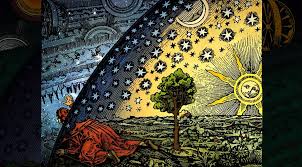
Library

Library Annex (since 2018)
Newsletters Old and New
Email Lambert Dolphin
November 6, 2021. November 24, 2022.